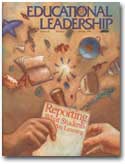Whenever adventurous educators try to change something about their schools, they find it connected to everything else. A good example is the current move to expand assessment beyond pencil-and-paper tests. In the three years I have been staff liaison to an ASCD-sponsored consortium on performance assessment, I've seen a change in consortium members' perspectives. I have noticed that many who thought their challenge was to devise good performance tasks and scoring procedures are now concerned with the relationship of assessment to curriculum and instruction. In the words of one teacher, “You can't test performance unless you teach performance.”
Most consortium members now see themselves engaged in performance-based education, which includes defining what students should be able to do, planning ways for them to learn to do it, teaching them, and—frequently as a natural part of instruction—assessing their performance. But even that is not all; once you've taught performance and assessed it, you have to keep a record of the performance, and be able to communicate the information to others—which requires changes in still other practices. That explains why educators trying to reform assessment have become interested in reporting.
As Tom Guskey (p. 14) notes, reporting has always been troublesome for educators. What teachers think is important may not be what parents want to know. And every possible method of reporting has its advantages and disadvantages. Use of a few simple symbols is efficient and easy to administer, but not very informative. Providing more details takes time and, if not done well, may lead to misunderstandings.
For many teachers and principals, the biggest concern is that the reporting system they are required to use violates their educational philosophy. When that is the problem, a good starting point, as Alfie Kohn (p. 38) reminds us, is to clarify purposes. Kohn argues that most of the commonly offered rationales for grading students are in fact questionable.
Much as they might like to do away with some aspects of reporting, however, most educators probably can't avoid the process entirely. What we must do, for our own peace of mind and to serve others well, is design the best system we can. Some of the articles in this issue may help. For example, Grant Wiggins (p. 28) offers six guidelines that, if followed, would produce a very different system.
It may surprise you to find that Wiggins does not propose getting rid of letter grades. For him, the issue is not what symbols to use but how to get greater specificity and clarity. What counts is that “clear standards and criteria are used, in a consistent way, by each teacher.”
In summary, educators are taking another look at the perennial topic of reporting because existing systems don't square with contemporary conceptions of instruction and assessment. As Marcia Seeley (p. 4) reports, schools are moving “from a test culture to an assessment culture.”
It's not an easy move to make, because as usual it is much more complex than at first seems apparent. But, if they use sound judgment and consider helpful suggestions like those of Guskey and Wiggins, schools should be able to develop reporting systems that both satisfy their clients and reflect their professional values.





